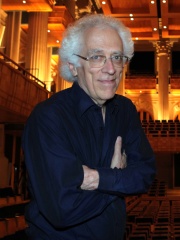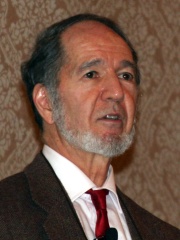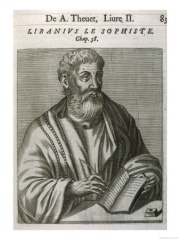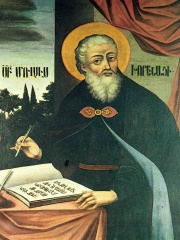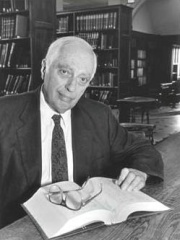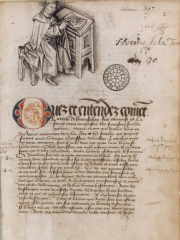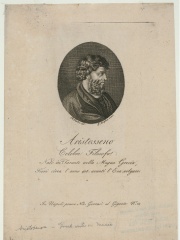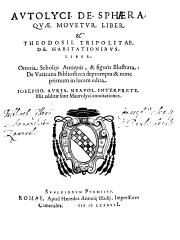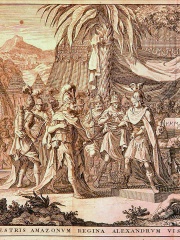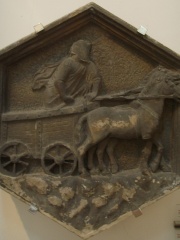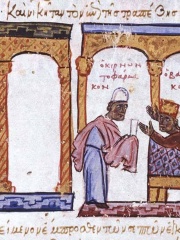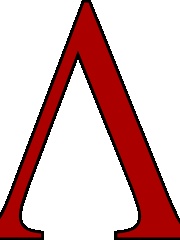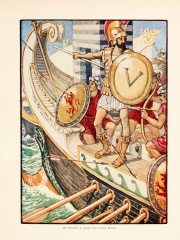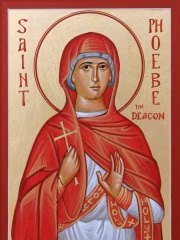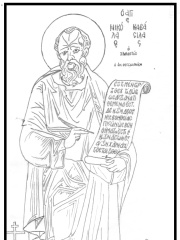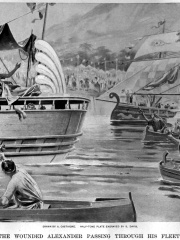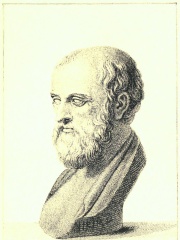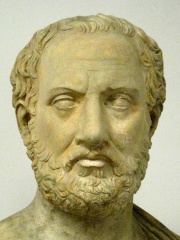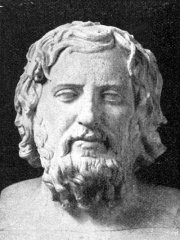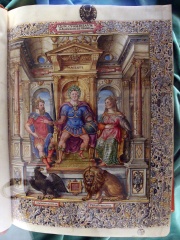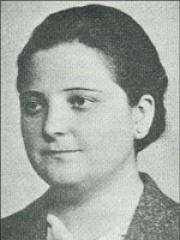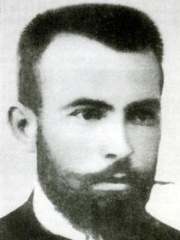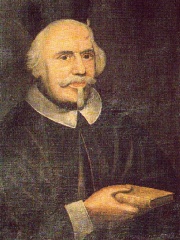Historian
Callisthenes
360 BC - 327 BC

 Callisthenes
Callisthenes
Callisthenes of Olynthus (/kəˈlɪsθəˌniːz/; Greek: Καλλισθένης; c. 360 – c. 327 BCE) was a Greek historian in Macedon with connections to both Aristotle and Alexander the Great. He accompanied Alexander the Great during his Asiatic expedition and served as his historian and publicist. Read more on Wikipedia
His biography is available in 34 different languages on Wikipedia (up from 33 in 2024). Callisthenes is the 67th most popular historian (down from 57th in 2024), the 202nd most popular biography from Greece (down from 169th in 2019) and the 5th most popular Greek Historian.
Callisthenes is most famous for being the historian who accompanied Alexander the Great on his conquests.
Memorability Metrics
Page views of Callisthenes by language
Among Historians
Among historians, Callisthenes ranks 67 out of 561. Before him are John Skylitzes, Heinrich Wölfflin, Tzvetan Todorov, Jared Diamond, Libanius, and Movses Khorenatsi. After him are Benzion Netanyahu, Theopompus, Bernard Lewis, Theophylact Simocatta, Geoffrey of Villehardouin, and Ephorus.
Most Popular Historians in Wikipedia
Go to all RankingsJohn Skylitzes
1040 - 1101
HPI: 70.52
Rank: 61
Heinrich Wölfflin
1864 - 1945
HPI: 70.43
Rank: 62
Tzvetan Todorov
1939 - 2017
HPI: 70.42
Rank: 63
Jared Diamond
1937 - Present
HPI: 70.39
Rank: 64
Libanius
314 - 393
HPI: 69.87
Rank: 65
Movses Khorenatsi
410 - 490
HPI: 69.73
Rank: 66
Callisthenes
360 BC - 327 BC
HPI: 69.54
Rank: 67
Benzion Netanyahu
1910 - 2012
HPI: 69.50
Rank: 68
Theopompus
400 BC - 320 BC
HPI: 69.44
Rank: 69
Bernard Lewis
1916 - 2018
HPI: 69.41
Rank: 70
Theophylact Simocatta
580 - 630
HPI: 69.32
Rank: 71
Geoffrey of Villehardouin
1150 - 1210
HPI: 69.24
Rank: 72
Ephorus
400 BC - 330 BC
HPI: 69.19
Rank: 73
Contemporaries
Among people born in 360 BC, Callisthenes ranks 1. After him are Aristoxenus, Autolycus of Pitane, Arses of Persia, Onesicritus, and Dionysius of Heraclea. Among people deceased in 327 BC, Callisthenes ranks 1.
Others Born in 360 BC
Go to all RankingsCallisthenes
HISTORIAN
360 BC - 327 BC
HPI: 69.54
Rank: 1
Aristoxenus
PHILOSOPHER
360 BC - 300 BC
HPI: 69.34
Rank: 2
Autolycus of Pitane
MATHEMATICIAN
360 BC - 290 BC
HPI: 68.73
Rank: 3
Arses of Persia
POLITICIAN
360 BC - 336 BC
HPI: 67.19
Rank: 4
Onesicritus
PHILOSOPHER
360 BC - 290 BC
HPI: 63.05
Rank: 5
Dionysius of Heraclea
POLITICIAN
360 BC - 305 BC
HPI: 58.32
Rank: 6
Others Deceased in 327 BC
Go to all RankingsIn Greece
Among people born in Greece, Callisthenes ranks 202 out of 1,024. Before him are Meton of Athens (-500), Thespis (-600), Agathias (536), Theophano (941), Pleistarchus (-500), and Brasidas (-500). After him are Gazi Husrev-beg (1480), Phoebe (50), Nicholas Kabasilas (1322), Nearchus (-356), Theopompus (-400), and Nicias (-500).
Others born in Greece
Go to all RankingsMeton of Athens
MATHEMATICIAN
500 BC - 460 BC
HPI: 69.92
Rank: 196
Thespis
ACTOR
600 BC - 560 BC
HPI: 69.86
Rank: 197
Agathias
WRITER
536 - 582
HPI: 69.86
Rank: 198
Theophano
POLITICIAN
941 - 976
HPI: 69.81
Rank: 199
Pleistarchus
POLITICIAN
500 BC - 458 BC
HPI: 69.76
Rank: 200
Brasidas
POLITICIAN
500 BC - 422 BC
HPI: 69.63
Rank: 201
Callisthenes
HISTORIAN
360 BC - 327 BC
HPI: 69.54
Rank: 202
Gazi Husrev-beg
POLITICIAN
1480 - 1541
HPI: 69.49
Rank: 203
Phoebe
RELIGIOUS FIGURE
50 - 100
HPI: 69.48
Rank: 204
Nicholas Kabasilas
RELIGIOUS FIGURE
1322 - 1391
HPI: 69.48
Rank: 205
Nearchus
MILITARY PERSONNEL
356 BC - 300 BC
HPI: 69.47
Rank: 206
Theopompus
HISTORIAN
400 BC - 320 BC
HPI: 69.44
Rank: 207
Nicias
POLITICIAN
500 BC - 413 BC
HPI: 69.38
Rank: 208
Among Historians In Greece
Among historians born in Greece, Callisthenes ranks 5. Before him are Thucydides (-460), Xenophon (-430), Polybius (-208), and Quintus Curtius Rufus (41). After him are Theopompus (-400), Michael Glykas (1125), Afet İnan (1908), Krste Misirkov (1874), Philochorus (-340), Marsyas of Pella (-400), and Leo Allatius (1586).
Thucydides
460 BC - 397 BC
HPI: 83.71
Rank: 1
Xenophon
430 BC - 354 BC
HPI: 82.05
Rank: 2
Polybius
208 BC - 126 BC
HPI: 77.83
Rank: 3
Quintus Curtius Rufus
41 - 53
HPI: 72.96
Rank: 4
Callisthenes
360 BC - 327 BC
HPI: 69.54
Rank: 5
Theopompus
400 BC - 320 BC
HPI: 69.44
Rank: 6
Michael Glykas
1125 - 1204
HPI: 64.91
Rank: 7
Afet İnan
1908 - 1985
HPI: 62.44
Rank: 8
Krste Misirkov
1874 - 1926
HPI: 61.77
Rank: 9
Philochorus
340 BC - 260 BC
HPI: 60.65
Rank: 10
Marsyas of Pella
400 BC - 360 BC
HPI: 58.87
Rank: 11
Leo Allatius
1586 - 1669
HPI: 57.12
Rank: 12


